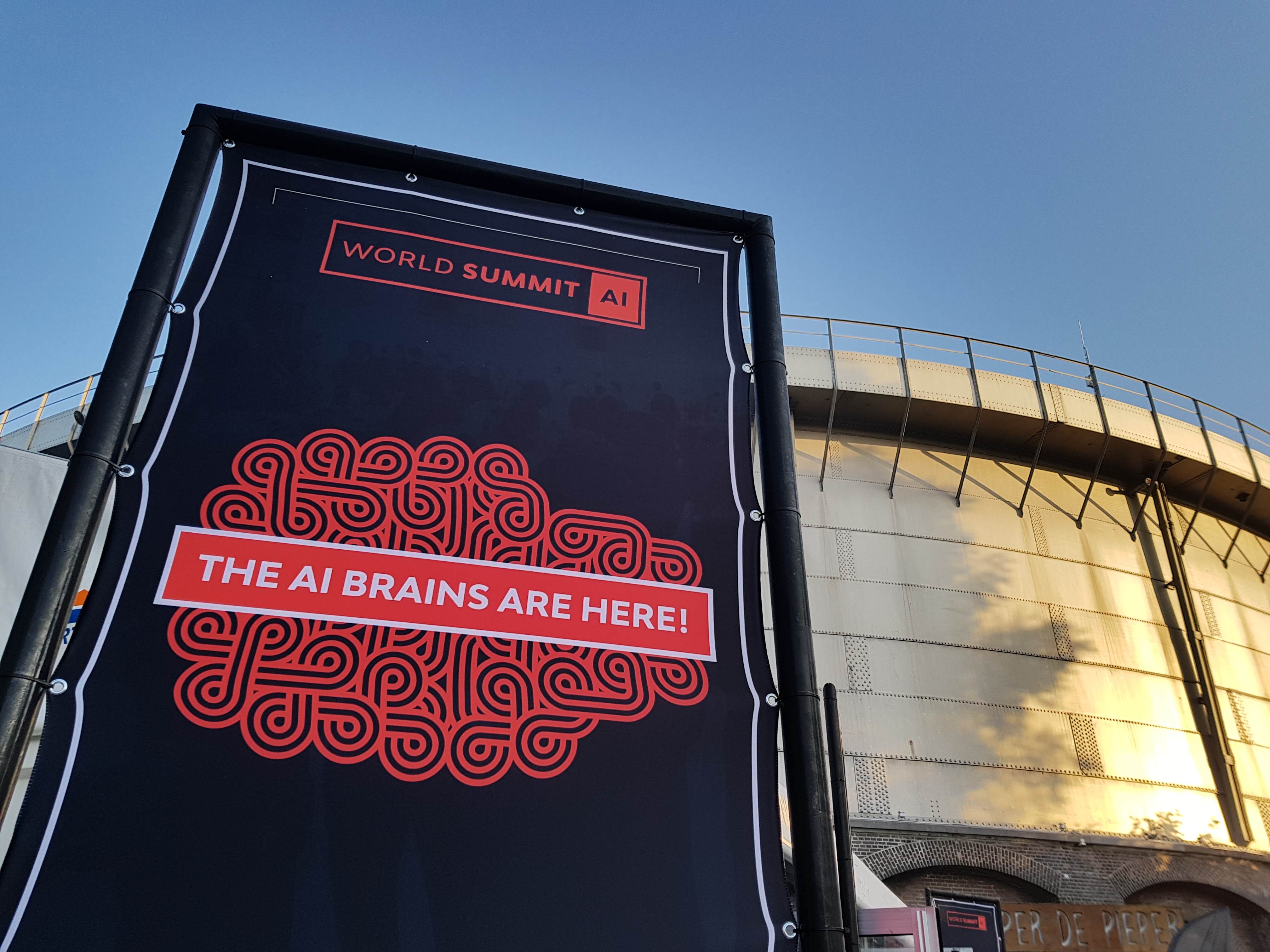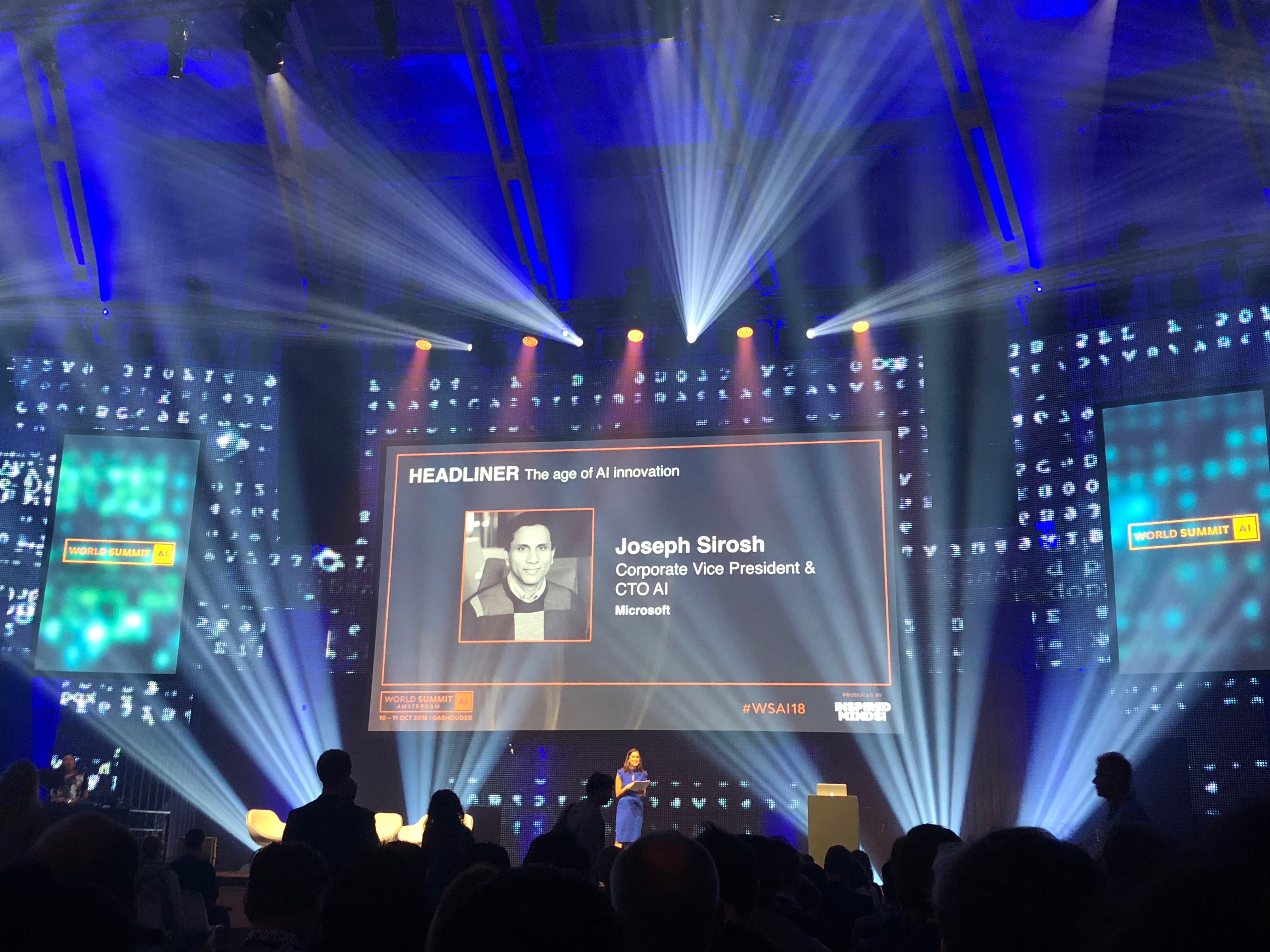AI is empowerment.
There are many other ways to define artificial intelligence of course, using terms like neural networks, machine learning, the cloud, and more. At its core, however, AI is about intelligence that augments humanity.
That’s the message that Joseph Sirosh, Microsoft’s CTO for AI, left thousands of attendees with during his keynote on the opening day of the World Summit AI in Amsterdam.
Walking on stage with a bright white prosthetic arm held high above his head, Sirosh jumped straight into a powerful, tangible example that AI can have on human lives.
A prototype created by two Canadian undergrad students who won the first prize at Microsoft’s Imagine Cup, the smartARM is a $100 3D-printed prosthetic with a built-in camera. Connected to Microsoft’s cloud-based AI services, it can automatically detect and recognise objects, while deep learning algorithms generate the correct grip or action to pick up the object.
“All of us – we’re going to grow old, we’re going to need assisted devices, and this is one area where AI will have a profound impact,” Sirosh stated. “Think about how we are breaking the limits here.”
On a panel prior to the keynote, Sirosh re-emphasised the importance of opening up the power of AI to the masses: “I’m most excited about democratizing AI. It should be like software – we need to democratize it so that AI can be part of every application.”
This was demonstrated further during a demo which saw the CTO search through tens of thousands of pdf files related to the JFK assassination, which were released to the public.
Typing ‘Oswald’ for example, instantly brought up all handwritten notes featuring the name – many written in handwriting that would test even the most experienced of teachers.
Not only that, but the AI system was intelligent enough to bring up Oswald’s mugshot, recognising his name on the placard he was holding up at the time, while also correctly labelling the location as New Orleans – and it will only become more intelligent over time.
“When you combine the power of cloud, mobile, edge devices and AI, then on top of that, a layer of human ingenuity, we will transform the world,” Sirosh stated.
Emotional Intelligence
We’ve seen examples of what AI can achieve for individuals and businesses, but it’s important to remember that we need to work with AI – to ensure it can in turn work with and for us, for maximum effect.
This has recently been made even clearer by a new report carried out by Microsoft in conjunction with Ernst & Young, called The Artificial Intelligence Report.
One finding shows that a key and common trait of companies that use AI successfully is emotional intelligence – the ability to identify and understand emotions. Or, in other words, having the ability to emphasise with people, to understand their motivations, and to foster open and collaborative environments.
Out of the 227 companies that were surveyed across 15 European countries, 80 percent which are at an advanced level of AI capability considered themselves to have strong emotional intelligence. In contrast, only 16 percent of the companies considered least-mature in AI, rated themselves as more than moderately competent in emotional intelligence.
Companies that are less mature in their use of AI could be more likely to focus on more immediate needs such as data management and analytics, without thinking beyond what AI can offer both individuals, and their organisations as a whole.
In contrast, Sirosh’s keynote at this year’s World Summit AI emphasised and reaffirmed Microsoft’s belief that the promise of AI lies in what it can do to amplify our ingenuity – not replace it – for the benefit of us all.
When humans and machines work together – that’s when the magic happens.
Microsoft at World Summit AI 2018
As the World Summit AI’s lead technology sponsor, Microsoft has various speakers, workshops and a booth at the Gashouder exhibition centre.
In addition to his keynote and being a member on a panel discussing AI from a leadership perspective, Joseph Sirosh also co-hosted an exclusive roundtable with Athina Kanioura, Global Data Science Lead, Accenture Applied Intelligence.
The roundtable, for C-level customers, focused on how clients can produce real business impact from AI, while hearing from experts and their peers n their respective AI journeys.
Microsoft is also participating in the running of three workshops – AI for Good, AI for Business, and AI for Developers, covering how we can use this technology for the benefit of everyone – from individuals to businesses – while helping developers start or continue their AI transformation.






